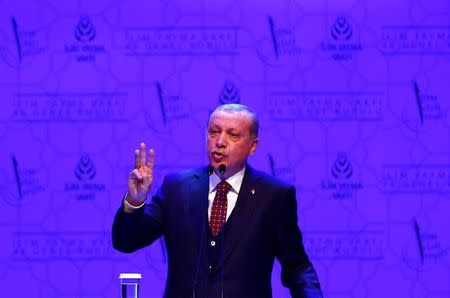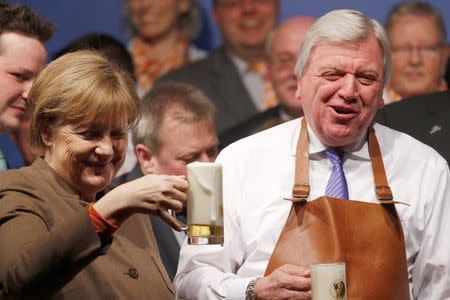No more Turkish rallies in Germany before referendum - organisers
By Andrea Shalal BERLIN (Reuters) - Turkish officials will take part in no further campaign rallies in Germany ahead of an April 16 referendum in Turkey, organisers said on Tuesday, after a key ally of German Chancellor Angela Merkel said they were not welcome in the country. The announcement by the Union of European Turkish Democrats (UETD) underscored a sharp deterioration in relations between NATO allies Germany and Turkey ahead of the referendum on boosting the powers of Turkish President Tayyip Erdogan. "We will not organise any further events with Turkish government officials before the referendum," UETD President Zafer Sirakaya told German magazine Wirtschaftswoche. The group, which organises rallies and represents Erdogan's Islamist-rooted AK Party in Europe, was not immediately available for comment. German local officials have cancelled several campaign rallies by Turkish ministers on its territory in recent weeks, citing security concerns, prompting Erdogan to accuse Berlin of using "Nazi" tactics, a charge that has incensed Merkel's government. "Enough is enough," Volker Bouffier, vice chairman of Merkel's Christian Democratic Union (CDU), said on Tuesday. "Mr. Erdogan and his government are not welcome in our country, and that must be now be understood," Bouffier, who is also premier of Hesse state, told DLF radio. German media had reported that Erdogan planned to visit Germany this month to rally the estimated 1.4 eligible Turkish voters living in the country to support his constitutional reform plans. Berlin has said it has not received a formal request for a visit by Erdogan. INSULTS Bouffier said such a visit would create security problems. "Someone who insults us in this way cannot expect that we will assemble thousands of police to protect him," he said. Reiner Haseloff, another member of Merkel's CDU and premier of Saxony-Anhalt state, echoed Bouffier's criticism. "Those who compare us to Nazis are not welcome. That is not acceptable," he told Die Welt newspaper in an interview published on Tuesday. He said Berlin should not rely on local and state governments to make decisions about visits by Turkish politicians as it has up to now. On Monday, Merkel again called on Turkey to stop the Nazi comparisons and said Berlin reserved the right to block future appearances by Turkish officials if they did not comply with German law, which explicitly forbids malicious disparagement of the government. Foreign Minister Sigmar Gabriel said the diplomatic note in which Berlin approved further visits by Turkish politicians had an explicit reference to the German law against disparagement. "If that happens, and there are violations of our laws, then will have to ... revoke the note" and approvals of various visits, Gabriel told reporters on Tuesday after a meeting with EU Commission Vice President Frans Timmermans. Timmermans said EU officials were united in rejecting the Nazi comparisons. "President Erdogan's comments about Germany and the Netherlands are not allowed. We don't want to be compared to Nazis," he said. The Netherlands, also home to a large ethnic Turkish diaspora, has been embroiled in a similar row with Turkey On Tuesday, Erdogan repeated his criticism of Germany and other European countries, saying today's "fascist and cruel" Europe resembled the pre-World War Two era. Erdogan also said Turkey could no longer be pressured by considerations such as a $6 billion migrant deal, under which it agreed to stop illegal migrants from crossing into Greece in exchange for financial aid and accelerated EU membership talks. "They cannot threaten us with any of these things anymore," he said. "Let's first switch to the new system on April 16, then there will be a very different Turkey rising." EU Commissioner Johannes Hahn told the Bild newspaper in an interview published on Tuesday that Turkey's prospects for joining the EU would be "increasingly unrealistic" unless it changed course and stopped moving away from European values. Hahn said the EU had repeatedly voiced its concerns about the "increasingly authoritarian path of President Erdogan". "Threats are no way to make policies. They make a reasonable dialogue impossible," he said. (Reporting by Gernot Heller, Andrea Shalal and Reuters TV in Berlin, and Tuvan Gumrukcu and Ece Toksabay in Istanbul; Editing by Tom Heneghan and Gareth Jones)



